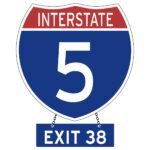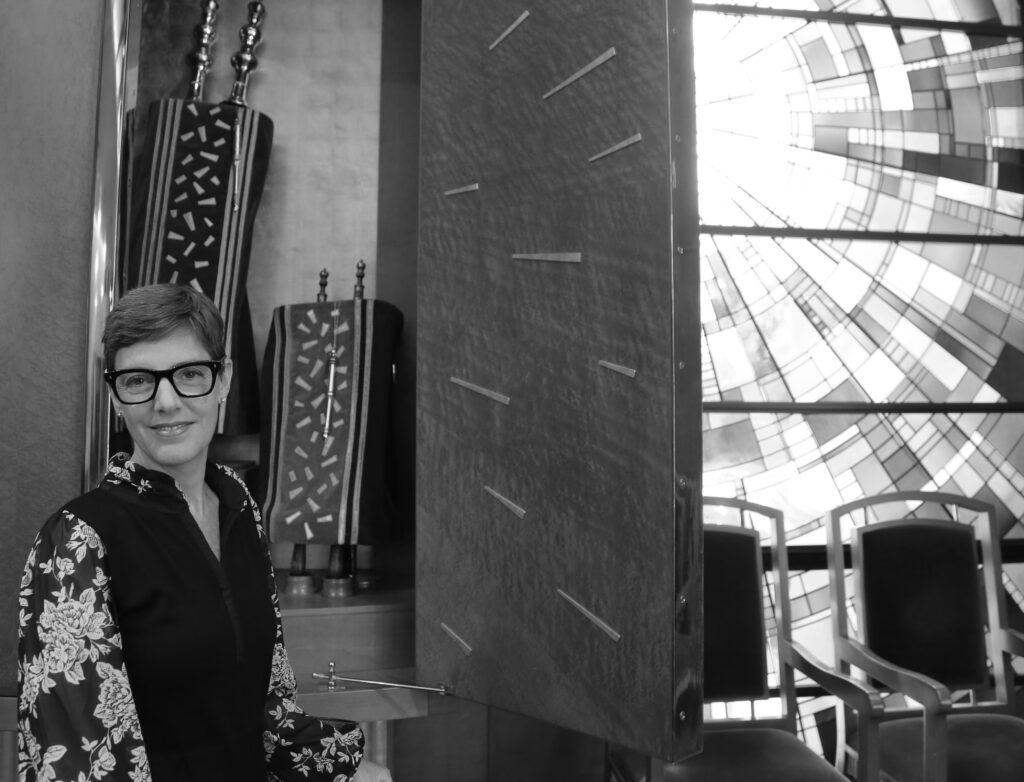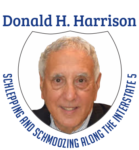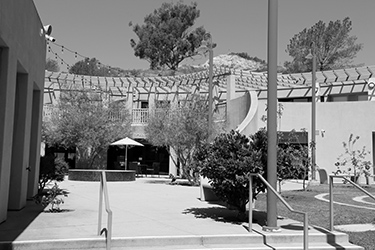 Editor’s Note: This is the 7th chapter in Volume 3 of Editor Emeritus Donald H. Harrison’s 2022 trilogy, “Schlepping and Schmoozing Along the Interstate 5.” All three books as well as others written by Harrison may be purchased from Amazon.com.
Editor’s Note: This is the 7th chapter in Volume 3 of Editor Emeritus Donald H. Harrison’s 2022 trilogy, “Schlepping and Schmoozing Along the Interstate 5.” All three books as well as others written by Harrison may be purchased from Amazon.com.
Schlepping and Schmoozing Along the Interstate 5, Volume 3, Exit 38 (Manchester Avenue): Temple Solel
From northbound Interstate 5, take Manchester Avenue exit, which loops around, turn left and go beyond Mira Costa College to Temple Solel at 3575 Manchester Avenue.

 ENCINITAS, California – In conversations, sermons and written word, Rabbi Alexis Berk has a lyrical appreciation for the places she has lived and for the interactions she has enjoyed with congregants and teachers. “Sacredness is everywhere; I like finding it and savoring it,” she says.
ENCINITAS, California – In conversations, sermons and written word, Rabbi Alexis Berk has a lyrical appreciation for the places she has lived and for the interactions she has enjoyed with congregants and teachers. “Sacredness is everywhere; I like finding it and savoring it,” she says.
Berk, the senior rabbi of Temple Solel (Pathfinder), grew up in New England and San Diego County with an appreciation for both. Holliston, Massachusetts, “had a certain hardiness and earthiness and sincerity that I really appreciated,” she commented during an April 2022 interview. “We heated our house with a wood stove and our family chopped the wood for it.”
In La Jolla, she was intoxicated by “the ocean, the natural beauty and the light, the appeal of California, the smell, just the magic.”
She was an undergraduate sociology major at UC San Diego when she found herself intrigued by the possibility of taking Hebrew for her language requirement rather than continuing with her high school French. That course was taught by Prof. William Propp, who was a well-known biblical scholar, and it “was really a first domino” toward her decision to apply following graduation to Hebrew Union College (HUC) in Cincinnati to become a Reform rabbi.
The next domino was to make Judaic Studies her minor, bringing her into contact with other Jewish scholars, including Richard Elliot Friedman, author of the seminal Who Wrote the Bible? That work laid out the documentary hypothesis, which ascribes Torah authorship to multiple human sources.
Yet another ‘domino” before her 1995 graduation from UC San Diego was attending a study-abroad program at Ben-Gurion University in Be’er Sheva, Israel, where she took “wonderful classes – medical ethics, sociology of immigration. It was fascinating because Be’er Sheva was a large immigration center at the time.”
Throughout her youth, Berk said she “always was drawn to Judaism. I thought there was something beautiful and other worldly and incredible and communal about it, and I was very interested.” However, the idea of becoming a rabbi struck her with awe and hesitation. “I think I presumed that there was some level of extra holiness that would have to accompany that, and I didn’t really think that was for me,” Berk said.
“Then I spent a lot more time with rabbis and rabbinical students and spent time at Camp Swig during college, where you can be more proximate to people studying to be rabbis and Jewish life. I don’t know, I guess I became more comfortable with it over time. That said, maybe I had preconceived notions that were of my own fictitious imagination. When you think about clergy, for lack of a better way of framing it, you think ‘Holier than Thou’ or of being an exemplar of some perfection. A lot of my rabbinate is really more about joining people along the journey rather than showing everybody how to do it right.”
The first year of her rabbinical studies was at the HUC campus in Jerusalem, an experience that was “incredible, powerful, immersive,” Berk said. She enjoyed being in Jerusalem and experiencing daily “frustrations, difficulties and triumphs.”
Berk was in Jerusalem the year that Israeli Prime Minister Yitzhak Rabin was assassinated by a fellow Jew.
“It was unforgettable,” she recalled. “The everyday of living in Jerusalem, exercising at the YMCA, being on King David Street, doing your grocery shopping with friends, let alone mourning the prime minister of Israel assassinated by an Orthodox Jew. The ordinary and the extraordinary both happen when you live in a place for a little while.”
Following that year in Jerusalem, she studied for four years at Hebrew Union College’s main campus. “Cincinnati was a resourced campus of historical enduring,” she commented. “An unbelievable collection of historical information about the Reform movement and the Jewish world. I felt that the professors were incredibly devoted. The campus was connected and communal. I felt really grateful to be in the midst of those.” Rabbi Berk was ordained in 2000.
Her first assignment following ordination was as a rabbi educator in Brentwood, Tennessee, at Congregation Micah, named for the biblical prophet Micah. From there she went on to become the Hillel rabbi at Vanderbilt University, but missing congregational life, she left that position to become director of congregational enrichment at Nashville Temple Ohabai Sholom (Those Who Love Peace).
In 2008, Berk moved to New Orleans to become the senior rabbi at the historic Touro Synagogue, which was founded in 1881 and named for Judah Touro. His father, Isaac, was the namesake of the oldest synagogue in the United States, the Touro Synagogue in Newport, Rhode Island. Berk was the first woman to hold the title of senior rabbi at the New Orleans congregation.
New Orleans, she would later reflect on Temple Solel’s website, was “a place of transformative prayer, expansive thought, fearless engagement, and love.” Being the rabbi at the Touro Synagogue, she told a reporter for Southern Jewish Life, was “blissful, unshackled, creative, joyous, challenging, exciting, energizing.”
Once, while describing how she developed ideas for sermons, she said that “explorations only come when there is an irritant in my own soul, a grain of sand that rubs, until perhaps there may become a pearl that can be worn as an amulet of our strivings.”
In that same sermon, she spoke of joining an interfaith gathering of spiritual leaders who publicly supported the removal from New Orleans of monuments celebrating Confederate history. “As spiritual leaders of New Orleans, we know the power of symbols, which is why we stand in support of their removal.”
“Empathy is the deepest form of connection that human beings can provide,” she said. “This I’ve come to believe. It is the most satisfying, most loving, mot universally craved yearning … We are all empathy deprived and wanting others to understand us. But, when it comes to offering empathy – it’s tough. But the stakes are very high and very real. When we endeavor to understand one another emotionally, we create love. But, when we don’t endeavor to understand one another emotionally, we create pain.”
Rabbi Berk knows personally not only how to offer empathy, but how helpful it can be to receive it.
During a road trip with her husband Bob (whom she met at UC San Diego) and their sons, Ari and Seth, a truck crossed a median and smashed into their car. The rabbi and Ari were hospitalized in Mobile, Alabama – she with broken ribs and a damaged spleen; he requiring a splenectomy. Her husband and younger son were more fortunate, sustaining only minor injuries.
There was an outpouring of misheberach prayers at the Touro Synagogue for their beloved rabbi and family. Using the traditional Hebrew names of the hospitalized family members and their parents, congregants asked for prompt healing for Ilana bat Kalman v’Aviva and Ari ben Reuven v’Ilana.
Although she loved serving in New Orleans, it was San Diego County, where she met her husband and where she found her calling, that ultimately exercised a greater pull on her.
In a 2019 Q&A published online, the leadership of Touro Synagogue felt it necessary to explain their beloved rabbi’s departure: “Rabbi Berk has always expressed her love for Touro Synagogue and the Touro community. She and her family were seeking a move to San Diego for purely personal reasons. She has repeatedly shown her appreciation for Touro’s past, present, and projected future … She is moving for family reasons … Touro is a strong and thriving synagogue. Rabbi Berk’s leadership helped to make that so and we will forever be grateful to her for the many ways that she helped to build our strong community.”

Upon arrival at Temple Solel, Rabbi Berk was reunited with Cantor William “Billy” Tiep, who had served from 2007 to 2010 as a cantor at the Touro Synagogue. She succeeded Rabbi David Frank as Temple Solel’s senior rabbi.
Rabbi Lenore Bohm, one of the first 50 women ordained as rabbis, had helped to found Temple Solel in 1984 and served many years as its senior rabbi. When she was a student, Rabbi Berk became friendly at that time with such other local Reform leaders as Rabbi Marin S. Lawson of Temple Emanu-El and Rabbi Deborah Prinz of Temple Adat Shalom. Over the years, Rabbi Berk and Rabbi Devorah Marcus, the current senior rabbi at Temple Emanu-El, formed a friendship.
The Temple Solel website noted, “This homecoming has felt very sweet. Her husband and two teenage sons – and their silly and sensitive dog, Russell … are so happy to be in North County where the eucalyptus perfumes the sea air, and the lagoon birds wake them with their melodic call to start the day. Together.”
In a piece published on the Temple Solel website, Rabbi Berk explained why she is a rabbi. She said she began to feel the calling at UC San Diego ‘among the eucalyptus groves – and when I was unexpectedly and tearfully moved by Yentl,” referring to the Barbra Streisand movie about a woman who had to disguise herself as a man to pursue her passion for Torah learning.
Excerpts from that essay include these observations:
“I am a rabbi because I see how people search deeply for the sacred, even in a world that pulls us evermore toward the secular. All of Judaism asks us to see the holy in the otherwise mundane. Sacredness is everywhere; I like finding it and savoring it.”
Being a rabbi “requires me to stand always at the intersection of courage, humility, and wisdom,” she wrote. “I don’t fear the microphone, but I prefer a gentle tone in prayer. I embrace leadership, but I also like to follow. I am a spirited teacher – mostly, though, the thinly veiled secret is that I’m a very thirsty learner.”
“I believe in a God who weeps alongside us, dreams and envisions our greatness, and celebrates mightily when we really get it. I am a rabbi because I love prayer – the melodic incantation of our ancient texts, the transforming uplift of modern interpretations, trying new things, enlivening the soul, coming together, and searching, inward, upward and onward.”
“And, I am a rabbi because I love to share that richness, teach that wisdom, and live that fullness with Jews looking for a way to find some kind of enchantment and meaning. It’s so much better together. Always.”
*
Donald H. Harrison is editor emeritus of San Diego Jewish World. He may be contacted via donald.harrison@sdjewishworld.com